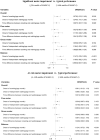Early Motor Milestones in Infancy and Later Motor Impairments: A Population-Based Data Linkage Study
- PMID: 35173640
- PMCID: PMC8841506
- DOI: 10.3389/fpsyt.2022.809181
Early Motor Milestones in Infancy and Later Motor Impairments: A Population-Based Data Linkage Study
Abstract
Background: Developmental Coordination Disorder (DCD) is a neurodevelopmental condition with high prevalence. Early motor milestones are important markers to identify DCD. The current study aims to evaluate the association between the onset of crawling and independent walking and their transition pattern during infancy and later motor impairments.
Methods: A total of 8,395 children aged 3-6 years old in China were included in the final analysis. A parent questionnaire was used to collect early milestone onset data. Children's motor performance was measured using the Movement Assessment Battery for Children-2nd edition (MABC-2). The association between motor milestones and motor impairment was analyzed using a multilevel regression model.
Results: The result showed that a 1-month delay in crawling onset increased the risk of significant overall motor impairment by 5.3, and 14.0% when adjusting for child and family characteristics. A 1-month delay in walking onset increased the risk of significant overall motor, fine, gross, and balance impairment by 21.7, 8.3, 13.3, and 17.8%. A 1 month increase in the transition time from crawling to independent walking increased the risk of significant overall motor and gross motor impairment by 7.7 and 6.6%. These results were inconsistent across different age bands (each p < 0.05).
Conclusions: Our study indicates that even a mild delay in crawling and walking onsets in infancy increase the risk for subsequent motor impairments in childhood, and children with motor impairments revealed a different transition pattern from crawling to walking. The motor abilities of children with motor impairments can be observed to diverge from typically developing children as early as 6-8 months old. The findings can facilitate the early identification of motor impairments in children, and provide early signs to initiate intervention.
Keywords: crawling; developmental coordination disorder (DCD); early motor milestone; independent walking; motor impairment.
Copyright © 2022 Hua, Williams, Jin, Chen, Xu, Zhou, Gu and Du.
Conflict of interest statement
The authors declare that the research was conducted in the absence of any commercial or financial relationships that could be construed as a potential conflict of interest.
Figures



References
-
- Blank R. European Academy of Childhood Disability (EACD): recommendations on the definition, diagnosis and intervention of developmental coordination disorder (pocket version). German-Swiss interdisciplinary clinical practice guideline S3-standard according to the Association of the Scientific Medical Societies in Germany Pocket version Definition, diagnosis, assessment, and intervention of developmental coordination disorder (DCD). Dev Med Child Neurol. (2012) 54:e1–7. 10.1111/j.1469-8749.2011.04175.x - DOI - PubMed
-
- Association AP. Diagnostic and Statistical Manual of Mental Disorders. Arlington, VA: American Psychiatric Association; (2013).
-
- Smits-Engelsman BC, Blank R, van der Kaay AC, Mosterd-van der Meijs R, Vlugt-van den Brand E, Polatajko HJ, et al. . Efficacy of interventions to improve motor performance in children with developmental coordination disorder: a combined systematic review and meta-analysis. Dev Med Child Neurol. (2013) 55:229–37. 10.1111/dmcn.12008 - DOI - PubMed
LinkOut - more resources
Full Text Sources

